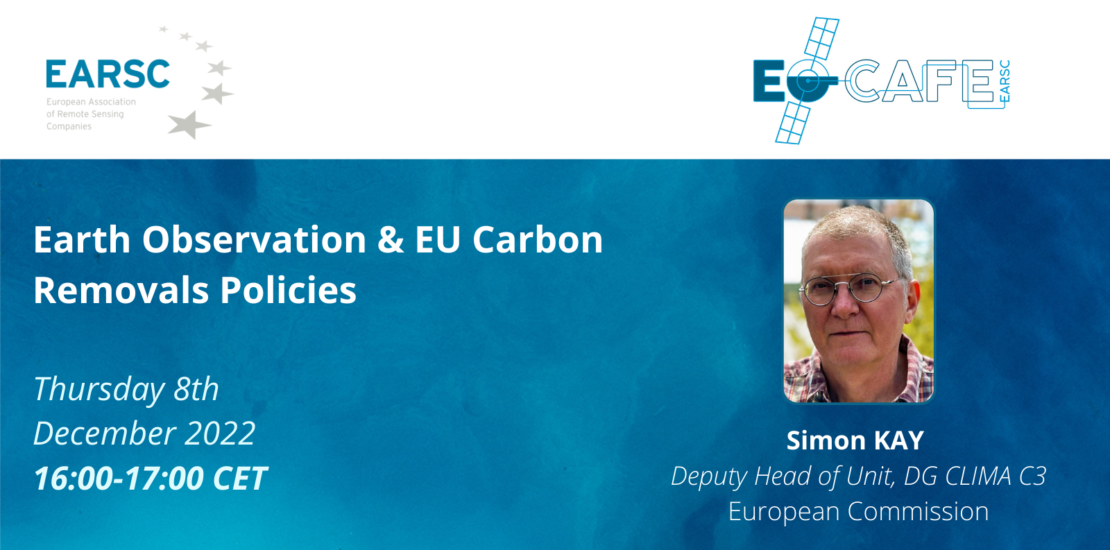- November 30, 2022
- Posted by: EARSC
- Categories: EOcafe, European EO Industry

Earth Observation & EU Carbon Removals Policies
Thursday, 8th of December 2022
In response to the urgency for climate action highlighted in the successive assessments of the Intergovernmental Panel for Climate Change (IPCC), the European Union has set into law its objective of economy-wide Climate Neutrality by 2050. The European Climate Law requires that greenhouse gas (GHG) emissions and removals are balanced within the European Union at the latest by 2050 with the objective to achieve negative emissions thereafter. The European Union has also set the goal of climate resiliency by 2050, to withstand the unavoidable impacts of climate change.
With the Proposal on the Certification of carbon removals, the European Commission is currently working on a potential piece of legislation aiming at developing the necessary rules to monitor, report and verify the authenticity of these removals. In doing so, the Proposal is looking at better understanding the range of carbon removal technologies available that would support the establishment and monitoring of CO2 capture in soils and forests as part of future emissions-reduction and carbon-trading initiatives.
Earlier this month, on 11th November, MEPs and EU countries also agreed to increase the EU carbon sinks target for the land use and forestry sector, which increases the EU’s 2030 greenhouse gas reduction target to 57%.
In the context of the European Green Deal and the Zero pollution Action Plan for 2050, there is little doubt that the use of digital solutions is becoming increasingly important to meet the European Union’s climate targets. More specifically, remote sensing technologies have a number of advantages, such as large spatial coverage, allowing to provide a continuous and global view of the Earth parameters. By combining satellite data with measurements from ground-based instruments and the use of technologies such artificial intelligence and machine learning, it is possible to have a wide range of applications and services providing instrumental information for the identification of the best geographical sites for establishing new afforestation/reforestation/restoration sites, monitor seasonal productivity and ongoing sequestration actions, helping to estimate ground biomass and support the evaluation of sequestrated carbon volume. With its accuracy and scope, satellite information is recognised as a crucial tool to measure, monitor and verify carbon storage. It quantifies above-ground biomass and estimates carbon sequestration based on earth observation and in-situ field measurements. Consequently, Earth observation information, such as data coming from the European flagship programme Copernicus, will be a key dataset for monitoring, reporting and verifying emissions and carbon removals for both farms and forests, and captured, stored and transported CO2.
With the Working Group on the Green Deal , EARSC’s objective is to gather its member’s views and expertise on how the downstream EO sector can support the European Green Deal and provide operational solutions to contribute to the EU climate targets. The importance of raising awareness and better communicating on the EO capabilities will be paramount to support data-driven decision making and policy-makers.
For this EOcafe dedicated on a specific item on the Green Deal’s agenda, let’s have a deeper look at the EU carbon removals policies and understand how the EO Downstream services industry can contribute to the achievement of EU climate targets!
Our host Geoff SAWYER (EARSC Strategic Advisor and former Secretary General) will discuss with Mr Simon KAY (Deputy Head of Unit, DG CLIMA C3, European Commission).
Topics which could be addressed during this EOcafe include the following:
- The role of EO capabilities to support the EU carbon removals policies
- The objectives of the EU with carbon removals policies
- The challenges and gaps identified by the EC in the context of the carbon removals policies
- The integration of EO capabilities in the Green Deal related policies and legislations
Registration: The webinar is open to ALL but priority will be given to EARSC members. Registration is free but compulsory. Please click on the following link to register.
Registration link
Please note this is a virtual event!
EOcafe is part of a series of EARSC meetings that offer timely, relevant, and practical information on a broad variety of topics related to the EO sector. Join us every two weeks to discuss and network while enjoying a cup of coffee with friends.
IMPORTANT NOTES!!!
- The use of a video camera is not mandatory but encouraged to facilitate better interaction among the attendees and the guest speaker(s).
- The EOcafe will stay open after 17:00 in case our guests want to continue the discussion.
- By registering for this event, you accept the terms and conditions (https://earsc.org/wp-content/uploads/2021/03/EARSC_Events_GDPR.pdf).
If you have any questions, and/or you want to know more about the EOcafe, and/or you want to share an idea about a future EOcafe, please contact Delphine (delphine.miramont@earsc.org) or Natassa (natassa.antoniou@earsc.org).
